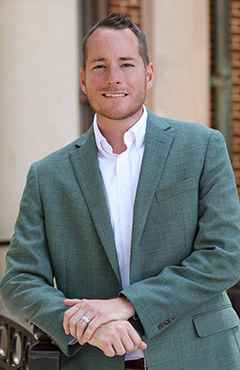
Lander University is at the helm of a statewide push to address sexual violence on college campuses with its creation of the South Carolina Institute on the Prevention of Sexual Violence on College Campuses (SCIP).
The institute was the vision of Lander President Richard Cosentino, who recognized that South Carolina colleges and universities could be catalysts for transformative change on this important national issue, driving a solution through research, advocacy and education. Cosentino worked with the General Assembly to secure funding for the institute, and in 2022, Governor Henry McMaster authorized its creation.
Serving all higher education institutions in the state, the institute is chartered at Lander but is housed at the university’s campus at University Center Greenville. It’s led by Dr. Matthew Hammett, who began as executive director in January of this year.
His work so far has been about building the SCIP brand, establishing connections with colleges and universities throughout the state, and strategically discussing prevention opportunities with administrators and others.
“I don't think necessarily that South Carolina has a high rate of sexual violence compared to other states, but it’s something that we're all facing and something that we're all addressing,” Hammett said. “I appreciate that South Carolina wanted to be a transformative leader in this field. No other state has designed a program quite like ours. I feel an urgency for the institute to make the impact for which it was intended, and there are myriad opportunities to maximize its efforts.”
In addition to providing information and resources, SCIP also awards annual grants that support sexual violence prevention programming, such as training, speakers and peer education. This past spring, eight institutions were recipients of those grants, totaling $32,000.
Along with higher education leaders, Hammett has also been meeting with rape crisis centers and other nonprofits, and he said the people who work in those organizations are excited to have additional layers of support.
“My approach when I reach out to individuals is this: ‘We want to be a resource. We want to help in any way that we can. We want to support your campus,’” Hammett said. “That's been met with positivity, and it has been met with this idea of us being able to work together, collaboratively. I think as we continue to forge connections and build relationships, it’s only going to grow in ways that support the state of South Carolina.”
The main goal, Hammett said, is to lower the occurrence of sexual violence, while strengthening research, advocacy, leadership and collaboration. “What we want are healthier, safer campuses that are focused on the wellness of the students.”
Hammett has spent 11 years working directly with Title IX, which oversees sex discrimination – including sexual harassment – in schools. The traumatic stories shared by so many students across the state and nation bring attention to the seriousness of these issues, he said.
“As a practitioner, I’ve heard the stories firsthand, and I’ve seen how the trauma impacts students, their families and friends,” he said. “Sexual violence is a nationwide issue, and we must address it in meaningful ways.”
He said the work of being a Title IX coordinator can be challenging and isolating. It comes with secondary trauma from working with people who have been impacted by sexual violence. One of Hammett’s objectives is to support coordinators around the state with education and leadership, “so that the work doesn’t feel so daunting…so that the work feels more collaborative.”
A long-term goal of the institute is to host a multi-day, statewide conference each summer, beginning in 2025, with national and international speakers and experts in the fields of sexual violence and Title IX.
Hammett said it has been a great experience seeing how institutions and organizations are ready and willing to focus on these issues and work together toward a solution.
“I want to make sure that we address these issues in a way that serves the students of South Carolina, as well as those that choose our state for their higher education experience,” he said. “Not only do we have an obligation, but we have an opportunity to change the lives of our college students. There is too much at stake to get it wrong. I want more than just a compelling vision, but the opportunity for systemic change.”
Up next for the institute is the hiring of additional staff, which will expand its scope. But for now, the focus is on extending sexual violence prevention grants, building relationships, and expanding the SCIP footprint across the state.
To learn more about the institute, visit scip.sc.gov.